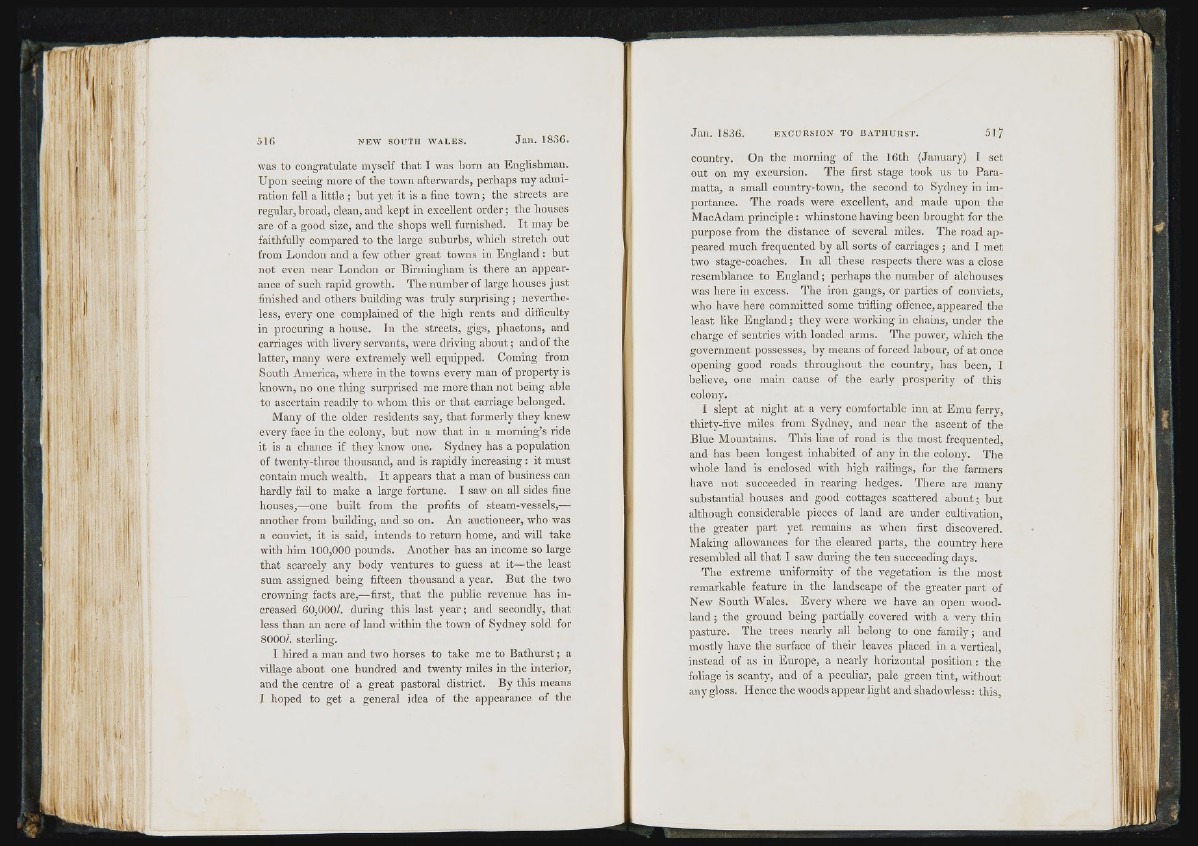
’ ai'i'
7:
I
! il
was to congratulate myself that I was bora an Englishman.
Upon seeing more of the town afterwards, perhaps my admiration
fell a httle ; but yet it is a fine town; the streets are
regular, broad, clean, and kept in excellent order; the houses
are of a good size, and the shops well furnished. It may be
faithfully compared to the large suburbs, which stretch out
from London and a few other great towns iu England : but
not even near London or Birmingham is there an appearance
of such rapid growth. The number of large houses just
finished and others building was truly surprising ; nevertheless,
every one complained of the high rents and difficulty
in procuring a house. In the streets, gigs, phaetons, and
carriages with livery servants, were driving about; and of the
latter, many were extremely well equipped. Coming from
South America, where in the towns every man of property is
known, no one thing surprised me more than not being able
to ascertain readily to whom this or that carriage belonged.
Many of the older residents say, that formerly they knew
every face in the colony, but now that in a morning’s ride
it is a chance if they know one. Sydney has a population
of twenty-three thousand, and is rapidly increasing: it must
contain much wealth. It appears that a man of business can
hardly fail to make a large fortune. I saw on all sides fine
houses,—one built from the profits of steam-vessels,—
another from building, and so on. An auctioneer, who was
a convict, it is said, intends to return home, and will take
with him 100,000 pounds. Another has an income so large
that scarcely any body ventures to guess at it—the least
sum assigned being fifteen thousand a year. But the two
crowning facts are,—first, that the public revenue has increased
60,000/. during this last year; and secondly, that
less than an acre of land within the town of Sydney sold for
8000/. sterling.
I hired a man and two horses to take me to Bathurst; a
village about one hundred and twenty miles in the interior,
and the centre of a great pastoral district. By this means
I hoped to get a general idea of the appearance of the
country. On the morning of the 16th (January) I set
out on ray excursion. The first stage took us to Paramatta,
a small country-town, the second to Sydney in importance.
The roads were excellent, and made upon the
Mac Adam principle: whinstone having been brought for the
purpose from the distance of several miles. The road appeared
much frequented by all sorts of carriages ; and I met
two stage-coaches. In all these respects there was a close
resemblance to England ; perhaps the number of alehouses
was here in excess. The iron gangs, or parties of convicts,
who have here committed some trifling offence, appeared the
least like England ; they were working in chains, under the
charge cf sentries with loaded arms. The power, which the
government possesses, by means of forced labour, of at once
opening good roads throughout the country, has been, I
believe, one main cause of the early prosperity of this
colony.
I slept at night at a very comfortable inn at Emu ferry,
thirty-five miles from Sydney, and near the ascent of the
Blue Mountains. This line of road is the most frequented,
and has been longest inhabited of any in the colony. The
whole land is enclosed with high railings, for the farmers
have not succeeded in rearing hedges. There are many
substantial houses and good cottages scattered about; but
although considerable pieces of land are under cultivation,
the greater part yet remains as when first discovered.
Making allowances for the cleared parts, the country here
resembled all that I saw during the ten succeeding days.
The extreme uniformity of the vegetation is the most
remarkable feature in the landscape of the greater part of
New South Wales. Every where we have an open woodland
; the ground being partially covered with a very thin
pasture. The trees nearly all belong to one family; and
mostly have the surface of their leaves placed in a vertical,
instead of as in Europe, a nearly horizontal position : the
foliage is scanty, and of a peculiar, pale green tint, without
any gloss. Hence the woods appear light and shadowless : this,